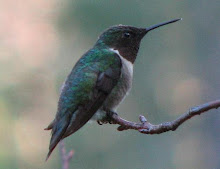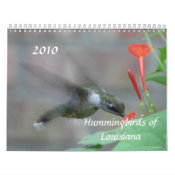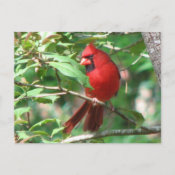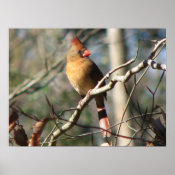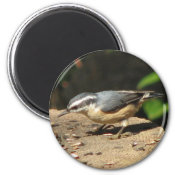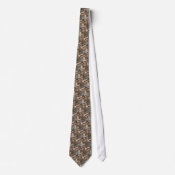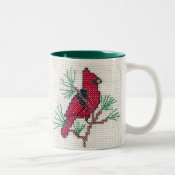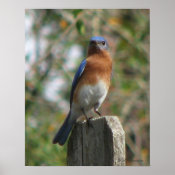skip to main |
skip to sidebar
We participated in the Audubon Society’s Christmas Bird Count for St. Tammany Parish, even though our heart wasn’t in it. Despite the foggy weather we had a pretty good showing. We observed for 5 hours at the feeders and in the woods on and around our property. During the 5 hour period we counted 25 different species of birds.
Our list includes: 1 Red-shouldered Hawk, 21 Mourning Doves, 3 Red-bellied Woodpeckers, 2 Downy Woodpeckers, 4 Blue Jays, 6 American Crows, 7 Carolina Chickadees, 5 Tufted Titmice, 1 Brown-headed Nuthatch ,6 Carolina Wrens, 5 Ruby-crowned Kinglets, 9 American Robins, 6 Pine Warblers, 3 Eastern Towhees, 1 Chipping Sparrow, 8 White-throated Sparrows, 10 Northern Cardinals, 26 Red-winged Blackbirds, 1 Common Grackle, 2 House Finches, 8 American Goldfinches, 1 Eastern Phoebe, 2 White eyed vireos, 3 Wood Ducks, and 1 Pileated woodpecker.
We've come up for air after a month of cutting and clearing fallen trees. We still haven't cut our way to check on all of the houses, but so far about 7 bluebird sized boxes were damaged and our new cypress wood duck box was knocked off the pole and the roof will need repair.
We are very concerned about the number of large black cherry trees that were up-rooted or broken. So many of the cavity nesters use these berries as a food source. We lost many oaks and have pine snags all over our property. To look on the bright side, it opened up the woods more so that more bluebirds may be attracted and the snags will provide places for woodpeckers to nest in the future, but the devastation is hard to believe.
We do have electricity now (ever since Sept. 18th) so we don't have to play generator tag with the water well pump and the refrigerator. It's so nice to be back in civilization, but we'll probably smell like chain saw smoke and wood chips for a couple of years! We were very lucky and our hearts go out to the people and the wildlife in the hard hit areas south of us. Our habitat will rebound. New growth is already sprouting up through the debris. We just need a little rain to clear things out. It was lucky that the storm hit at the end of the breeding season so that no nests were lost. Nestboxes can be repaired.
The Electricity was restored today. Tears came into my eyes when I saw those big orange trucks come to our house. We have been surviving on MRE's and the water and ice that we get from the relief station. There has been no rain since Katrina and it's extremely hot. With the help of our family and a church group, we've been able to clear the trees from around the house and have gotten them out of the pond, but not before there was a fish kill. We also cut a walking trail to the river where there was a massive fish kill. At least we can put food out to help the animals down in the woods. It's going to take years to get our habitat to normal, but it will never be like it was before.
During the storm, the migrating ruby-throated hummingbirds fed from the feeders that we had wired down. Cardinals, doves, chickadees and tufted titmice fed from the seed feeders. None of the feeders were damaged, but many of the nest boxes on our trail were torn apart or knocked down. Luckily, most of the cavity dwellers had finished nesting before the storm hit. Many of the dead pines that were used by woodpeckers were blown down. While we'll have plenty of trees to replace them in a few years, a nesting cavity shortage will occur next spring, because many need partially decayed wood to hollow out their cavities.
Another repercussion of the downed trees is a shortage of food for wildlife. Black cherries are one of the most widely used berries and are eaten by over 30 species of birds and many mammals. Oaks also provide food in the form of acorns for all kinds of animals. Many of the smaller food bearing trees like sassafras, black gum and yaupon were also destroyed. It will take years for the small trees that are left to grow enough to provide the same amount of food that the downed ones did.
Our pets have suffered a lot, especially our 14 year old cat. The generator would only run a small window a/c unit for part of the house where our 2 dogs are. She doesn't like the dogs, but finally couldn't take the heat anymore and came in with the rest of us.
Hurricane Katrina tore through St. Tammany Parish, spawned tornadoes in it's wake. Our circular driveway is totally blocked by at least 8 trees, some are about 3 ft. in diameter. We counted 30 giant pines in our yard that were snapped off like match sticks. Dozens of large oaks, hickories, black cherry and other hardwoods were either uprooted or broken when the big pines fell. Our 9 acres lay in ruin and it looks like we were bombed. Our road to the river is gone, covered with piles of debris. The trees that are still standing have no leaves. Most of the nest boxes on our trail are damaged or destroyed. Luckily, nesting season is over. Our gardens are under piles of debris. The wildlife is dazed and is looking for food. We have no electricity because one of the trees that fell on the driveway also took down the electric wire, pulling the weatherhead from the roof of the house.
By late afternoon we were able to cut a swath wide enough for the car (the van is under 3 trees) to the main road so that we could get out to call our family and to look for ice and gasoline. From now on we are in survival mode. We will need another chainsaw and a generator. The whole area is without power. Poles and lines are down everywhere.
Success!! All the climbing & balancing in trees to get the big wood duck house down to repair it & mount it on a pole with predator baffle has paid off. Yesterday morning we were greeted by 12-14 wood duck ducklings in the river right by the box. We checked the box today and found the egg shells inside all stacked nicely like nester dolls. The other box that we made from cypress scraps has a wood duck hen sitting on about 10 eggs.
Everything is late down here in south LA. In the smaller houses we have 3 Chickadee nests, 2 with 6 eggs each and the Eastern Bluebirds have finally built a nest in one by the pond. We built 2 sizes of smaller (with 1 1/4" holes) than bluebird spec houses for the chickadees & prothonotary warblers this year. So far the chickadees are using one of the small houses, 1 that is shorter than a standard NABS house & one old one from Wal Mart. The Prothonotary males are back, darting around and staking out territory & houses.
A Carolina wren has forsaken all of the houses and is sitting on eggs in a nest in the top hole of a pair of cinder blocks that we stacked and used as a saw horse to make the nest boxes! We found another nest, without eggs, inside the upturned canoe that was stored on the bluff by the river. A friend found a nest in a fitted sheet that had been hanging on a line for a couple of days. They really do build in the strangest places.
On January 2, we surveyed our small nest box trail, making notes of houses needing repair, soaping ceilings and cleaning out debris. We also spruced up & moved a box that had no takers last year. Two of the wood duck boxes, that we foolishly mounted on trees, have been taken over by honey bees. We have opted to build new houses (one is already completed & up) and mount them on 2" pipes with baffles.
We have also finished & erected 3 Chickadee/Prothonotary size wooden houses to replace the cardboard milk carton ones. Two bluebird types are marked & ready for the saw. But, we still need to get the long ladder & climb up to rescue the one remaining bee-free tree mounted wood duck house. Whew!!
I just went to Home Depot and the 1" (10ft.) metal conduit that we used to get for under $5.00 is now $10.99!!! I had to downsize to the $5.99 3/4" ones. I'm going somewhere else next time. There must be a steel shortage or something.
On the CBC for St. Tammany we observed 8 wood ducks, 3 eastern bluebirds and 4 different kinds of woodpeckers. Male bluebirds have been singing for 3 weeks and in December a pair investigated the box that was used last year.
One of our Taiwan cherry trees is beginning to bloom. But in LA where the weather is concerned we always expect the unexpected - 80 degrees one day, 30 the next. It may feel like spring, but winter isn't over yet. There is still some wild food available for the birds. The Yaupon and deciduous holly still have berries, as do the dreaded Chinese privet and ligustrum and our oak trees had a bumper crop of acorns (wood duck favorite) this year.
